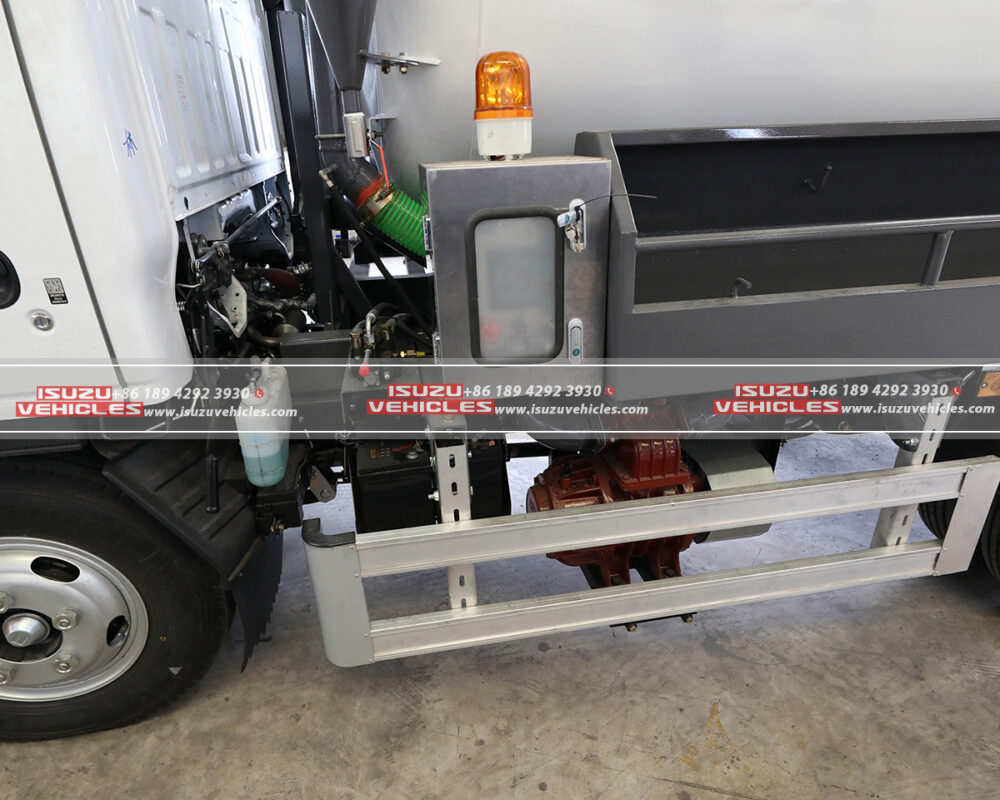ISUZU sewer trucks are indispensable tools for municipal and industrial waste management, designed to handle the challenging task of transporting and disposing of sewage and wastewater. These vehicles are built to withstand harsh conditions and heavy use, but like any specialized equipment, their performance depends on proper operation and timely troubleshooting. Understanding how to operate and maintain ISUZU sewer trucks effectively can help operators maximize efficiency, prevent breakdowns, and extend the vehicle’s lifespan. This guide provides valuable insights into operating and troubleshooting ISUZU sewer trucks, while also highlighting the importance of maintaining other ISUZU vehicles like the ISUZU vacuum truck and ISUZU sweeper truck.
1. Mastering the Basics of Operation
Operating an ISUZU sewer truck requires a combination of technical knowledge and practical skills. These vehicles are equipped with specialized systems, such as vacuum pumps and hydraulic mechanisms, which must be handled with care to ensure optimal performance.
Key aspects of proper operation include:
- Pre-Operation Checks: Before starting the truck, inspect the vacuum pump, hoses, and tank for any signs of damage or wear. Ensure all systems are functioning correctly and that there are no leaks or blockages.
- Loading and Unloading: Follow manufacturer guidelines for loading and unloading sewage to avoid overloading the tank or damaging the pump system. Overloading can strain the vehicle’s chassis and hydraulic systems, leading to costly repairs.
- Driving Techniques: Drive smoothly and avoid sudden stops or sharp turns, especially when the tank is full. This reduces stress on the truck’s suspension and prevents spills or accidents.
By mastering these basics, operators can ensure their ISUZU sewer truck performs efficiently and safely, even in demanding conditions.
2. Routine Maintenance for Peak Performance
Regular maintenance is essential for keeping an ISUZU sewer truck in top condition. These vehicles are exposed to corrosive materials and harsh environments, making consistent upkeep critical to prevent breakdowns and ensure safety.
Here are some critical maintenance tasks to prioritize:
- Daily Inspections: Before each shift, inspect the truck for leaks, damaged hoses, or worn-out components. Check the tank, pump, and hydraulic systems for signs of wear or corrosion.
- Fluid Checks: Regularly check and top off essential fluids, including engine oil, hydraulic fluid, and coolant. Dirty or low fluids can lead to system failures and reduced performance.
- Tire and Brake Maintenance: Inspect tires for proper inflation and tread wear, and ensure the braking system is functioning correctly to maintain safety on the road.
- Cleaning and Corrosion Prevention: After each use, thoroughly clean the truck’s exterior and tank to remove sewage residue, which can cause corrosion over time. Apply protective coatings to vulnerable areas to prevent rust.
By incorporating these tasks into your maintenance routine, you can keep your ISUZU sewer truck running smoothly and avoid unexpected downtime.
3. Troubleshooting Common Issues
Even with proper operation and maintenance, ISUZU sewer trucks may occasionally encounter issues. Knowing how to troubleshoot common problems can help operators address them quickly and minimize downtime.
- Reduced Suction Power: If the vacuum pump is not generating sufficient suction, check for blockages in the hoses or tank. Inspect the pump’s filters and seals, and replace them if necessary.
- Hydraulic System Malfunctions: If the hydraulic system is not functioning correctly, check for leaks in the lines or cylinders. Ensure the hydraulic fluid is clean and at the proper level.
- Engine Performance Issues: If the engine is running poorly, inspect the fuel system, air filters, and exhaust system for blockages or damage. Regularly servicing the engine can prevent many performance issues.
By addressing these issues promptly, operators can ensure their ISUZU sewer truck remains reliable and efficient.
4. Specialized Maintenance for Sewer Truck Systems
In addition to routine maintenance, ISUZU sewer trucks require specialized care for their unique systems, such as the vacuum pump, tank, and hydraulic mechanisms. These tasks often require the expertise of trained technicians to ensure proper servicing.
- Vacuum Pump Servicing: The vacuum pump is the heart of the sewer truck, responsible for suction and discharge. Regularly inspect the pump for wear, clean its filters, and replace seals or valves as needed to maintain optimal performance.
- Tank Integrity Checks: Inspect the tank for cracks, leaks, or corrosion, which can compromise its ability to hold sewage safely. Repair or replace damaged sections promptly to prevent further deterioration.
- Hydraulic System Maintenance: The hydraulic system powers the truck’s lifting and dumping mechanisms. Check hydraulic lines and cylinders for leaks, and ensure the fluid is clean and at the proper level.
These specialized maintenance tasks are crucial for preserving the functionality and safety of your ISUZU sewer truck, ensuring it remains a dependable tool for waste management.
5. Leveraging ISUZU’s Support and Resources
ISUZU is committed to helping operators get the most out of their vehicles, offering a range of resources and support services to assist with maintenance and operation. From detailed maintenance manuals to access to certified service centers, ISUZU provides the tools you need to keep your sewer truck in peak condition.
For businesses operating other ISUZU vehicles, such as the ISUZU vacuum truck or ISUZU sweeper truck, the same principles of proper operation and maintenance apply. These vehicles also benefit from ISUZU’s dedication to durability and reliability, ensuring they remain effective tools for their respective tasks.
By leveraging ISUZU’s expertise and resources, you can ensure your sewer truck and other specialized vehicles continue to deliver exceptional performance and longevity.
Proper operation and maintenance are essential for maximizing the lifespan and performance of ISUZU sewer trucks. By following best practices, conducting routine inspections, and addressing specialized maintenance needs, operators can ensure these vehicles remain reliable and efficient for years to come. Whether it’s a sewer truck, ISUZU vacuum truck, or ISUZU sweeper truck, taking care of your equipment is the key to achieving long-term success in waste management and beyond.
